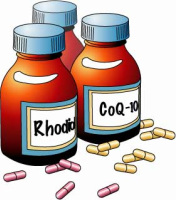Coenzyme Q-10 (CoQ10)
|
|
One of the most tragic things I know about human nature is that all of us tend to put off living. We are all dreaming of some magical rose garden over the horizon instead of enjoying
the roses that are blooming outside our windows today. —Dale Carnegie |
10 Tips for Vibrant Health

Coenzyme Q-10 (CoQ10) is a vitamin-like substance naturally found in cells throughout your body. It has strong antioxidant activity and it helps to energize the cells. CoQ10 seems to have numerous benefits with few side effects.
Though it may be found in small amounts in some meats and seafood, most often CoQ10 is laboratory-made and you would take it as a food supplement. Here are 10 ailments that researchers are targeting for CoQ10. 10. Coenzyme Q-10 Deficiency
There are two conditions for which CoQ10 is considered most likely effective. Some people are born with CoQ10 deficiency. Supplementing will improve those individuals, both children and adults. And people who have mitochondrial disorders are likely to see improvements. This is at the cellular level, where cells of the body have limited energy production. 9. Heart-Protective Effects
CoQ10 is being used in various heart health situations, such as congestive heart failure (CHF); decreasing the risk of additional heart attacks after myocardial infarction (MI); reducing blood vessel damage when taken before heart bypass surgery; and chest pain (angina). 8. High Blood Pressure
CoQ10 lowers blood pressure. By itself or taken with other blood pressure medications it can help reduce high blood pressure. 7. Cancer
Research on cancer shows CoQ10 may have a role in fighting certain cancers by: * slowing or improving some degenerative diseases * decreasing weight loss and muscle wasting associated with cancer * counteracting the toxic effects of chemotherapy * supporting therapy during cancer remission. 6. Neurological and Neurodegenerative Diseases
CoQ10 supplements might slow early Parkinson’s disease; may be effective for Huntington’s disease, a rare condition; and may help prevent or treat neurodegenerative conditions related to environmental toxins. 5. Muscular Dystrophy
Muscular dystrophy is an inherited disorder with muscle wasting. CoQ10 seems to improve the physical performance of some individuals with muscular dystrophy 4. Dental (Periodontal) Disease
CoQ10 may be helpful in treating periodontal disease. It can be applied directly to teeth and gums or taken as supplement. 3. Preventing Migraine Headaches
Taking CoQ10 has shown good results in helping to prevent migraine headaches. It can decrease the frequency of headaches and also reduce the number of days of nausea related to migraine. 2. Immune System Boosters
Fibromyalgia, Fatigue, Lyme disease, HIV/AIDS Taking CoQ10 gives positive effects to the immune system. Taken along with ginkgo, it may increase a sense of wellness or health and reduce the feelings of pain and fatigue. 1. Extend Life Span
CoQ10 may have benefits for common age-related disorders, such as age-related macular degeneration, age-related deficits in cognitive function, and Alzheimer’s disease. In cases of sensorineural hearing loss that is genetically based, CoQ10 may help to prevent further hearing loss. CoQ10 limits the decline in naturally occurring antioxidants that happens as you get older. Live longer and better. For more detailed information: http://www.nlm.nih.gov/medlineplus/druginfo/natural/938.html Source Facts: Natural Medicines Comprehensive Database, National Institute for Health, National Library of Medicine
|
|
|
CoQ10 performs many important functions in the body. It has shown great promise for improving certain ailments. However, more research is needed. No doubt researchers will continue investigations into this vital nutrient.
Note: CoQ10 is most likely safe for adults as a food supplement. It can have some mild side effects, such as loss of appetite, stomach upset, nausea, diarrhea, or skin rashes. CoQ10 lowers blood pressure. If you have low blood pressure, be sure to check your blood pressure carefully. Taking the daily dose in small amounts over the day instead of all at once can help reduce the side effects. If you liked this article on CoQ10, you may enjoy learning about the natural herbal supplement Rhodiola in this article. Read more articles about natural health in Well-Being. |
CommentsPosted 10/24/13
I don’t see a dosage anywhere. What is the dose? How much do I take? SueRSM3011 Follow the given dosage on the bottle that you have purchased or take the dose that your doctor suggests. 100mg might be a good start. CoQ10 come in two forms uniquinone and ubiquinol, with ubiquinol being easier absorbed. A fish oil supplement that contains CoQ10 is a good vehicle for taking it. --OSN |
DISCLAIMER The content on SimpleTens is for educational purposes only and designed to support minor health issues, not to replace medical or psychiatric treatment. If you are concerned about a health issue, please see a health professional. Please read the full Disclaimer.


